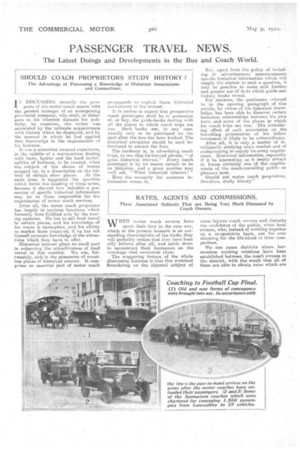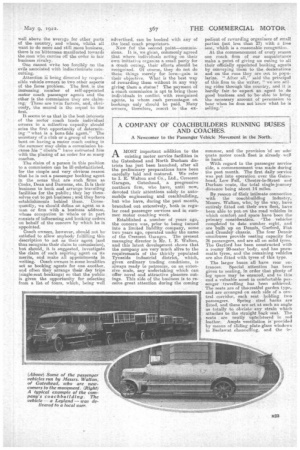RATES, AGENTS AND COMMISSIONS.
Page 24

Page 25

If you've noticed an error in this article please click here to report it so we can fix it.
Three Associated Subjects That are Being Very Much Discussed by Coach Owners.
WHEN motor coach owners have spent their fury in the rate war, which at the present moment is an outstanding characteristic of the trade, they will probably realize that they have been silly fellows after all, and settle down to reconstruct their businesses on the wreckage that surrounds them.
The staggering feature of the whole distressing business is that this wretched floundering on the abysmal subject of rates injures coach owners aril disturbs the coefidenee of the public, when local owners, who, instead of working together on a co-operative basis, are for ever thirsting for the life-blood of their competitors.
We can name districts where harmonious working relations have been established between the coach owners in the district, with the result that all of them are able to obtain rates which are well above the average for other parts of the country, and where, whilst all want to do more and still more business, there is no bitterness manifested towards the man who carries off the order in fair business rivalry. One cannot write too forcibly on the evils associated with indiscriminate ratecutting.
Attention is being directed by responsible vehicle owners to two other aspects of the faxes problem. The first. is the increasing number of self-appointed motor coach passenger agents and the ether is the commission they are claiming: These are twin factors, and, obviously, the second is the sequel to the first.
It seems to us that in the best interests of the motor coach trade individual owners in a collective capacity should seize the first opportunity of determining "what is a bona-fide agent." The secretary of a club or a group of workers bent on having a motor coach outing in the summer may claim a commission because his" clients" have entrusted him with the placing of an order for so many coaches.
The claim of a person in this position to a commission can be ill-substantiated, for the simple and very obvious reason that he is not a passenger booking agent in the sense that are such firms as Cooks, Dean and Dawsons, etc. It is their business to book and arrange travelling facilities for the public; they lay theinselves out to get business ; and they have establishments behind them. Consequently, we should define ari agent as a tnan Or firm with a business address, whose occupation in whole or in part, consists of influencing and booking orders on behalf of the concern by which he is appointed.
Coach owners, however, should not be satisfied to allow anybody fulfilling this description to aot as their agent (and thus recognize their claim to commission), but should, it is suggested, investigate the claim of each aspiring agent on its merits, and make all appointments in writing. Coach owners in some localities act as booking agents for one another, and often they arrange their day trips single-seat bookings) so that the public is given the opportunity for selecting from a list of tours, which, being well advertised, can be booked with any of the local coach proprietors.
Now for the second point--cominissions. It is, we glean, commonly agreed that where individuals acting on their Own initiative organize a small party for a a.oh outing, their efforts should be rec gnized. Of course, they do not do thee things merely for love—gain is the r objective. What is the best way of rewarding them without in any way giving them a status? The payment of a coach commission is apt to bring these individuals in conflict with recognized agents, to whom cash percentages on bookings only, should be paid. Many owners, therefore, resort to the ex
pedient of rewarding organizers of small parties (not less than 27) with a free seat, whieh is a reasonable recognition.
At the commencement of every season one coach firm of our acquaintance make a point of giving an outing to all their officially appointed booking agents by conveying them to the destinations and on the runs they are out to pcepularize. "After all," said the principal of this firm to the writer, " we are selling rides through the country, and it is hardly fair to 'expect an agent to do good business and, to be able to bring the necessary amount of perseasion to bear when he does not know what he is selling."




































